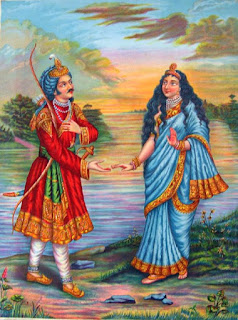The lake inspiration
(source: wikipedia)
"Paul, I really want to go out and do something," Michelle said abruptly.
"What did you have in mind?" Paul replied.
"You know that forest about a mile south of our complex?"
"I think so."
"Let's go explore it!"
Paul eagerly agreed and the couple decided to walk to the forest as they both preferred walking over mechanical transportation. Once they arrived, they immediately made their way into woods. Paul, being an artist, was amazed at the pure beauty of the forest. He was mentally capturing inspiration for potential art pieces. Michelle, on the other hand, was busy taking pictures with her phone to post on Instagram.
"Let's go deeper!" Michelle yelled.
She grabbed Paul's hand and the couple traveled farther into the woods. The two continued their same actions with Paul's mental notes and Michelle's photo chaos. It was beginning to get dark and Paul looked at Michelle with concern.
"I think we should go back. We've been here for a few hours. I also really need something to drink."
"Fine."
The couple agreed that it might be smarter to completely travel through the forest rather than backtrack as they would reach the street at a faster rate. The wooded area was only a mile long and they both figured they were more than half way through it. They walked and suddenly came across a small body of water.
"I'm getting a drink. I can't wait any longer."
Paul walked down to the edge of the water and formed his hands into a makeshift bowl.
"Paul, no!"
"It's just water, Michelle."
"You don't know what's in there. Please, don't drink it. If you love me and trust me, you won't take a drink of that water."
"Michelle, you're being ridiculous."
Paul reached out his hands and placed them into the water. He drank a few portions and then walked back up to where Michelle was standing. She was sobbing. He was about to ask what was wrong, but then he felt a stinging in his chest. His vision became fuzzy until his body completely shut down and he collapsed to the ground.
"Paul, you idiot!"
Paul's life left his body. Michelle began to cry hysterically as she knew exactly what had happened. She had gone to the forest the day prior and completely contaminated the water with a toxin that would kill any living thing. It was a trial for her boyfriend. She led him there to test his love and trust for her. She requested that Paul not drink if he loved and trusted her. Since Paul drank, he obviously had none of this for her. She was so hurt. She walked over to the water and took a drink of the water herself. Michelle walked over to Paul's corpse and curled up beside him to meet death.
---
Author's note: This story is very loosely based off the reading as compared to my other stories. I used the idea of the Pandavas and their own test they had by the lake. They were thirsty so they decided to drink at the lake. When told not to, they disobeyed and drank anyway. This resulted in their temporary death. I decided to completely dissociate from the epic and try and create my own story with my own characters while somewhat referring to aspects from the Mahabharata. This creation of my own story was inspired from reading the stories of others in this course. A fair share of students in this class have used certain situational pieces from the epic and morphed them into a modern-day scenario. This is where my story took place as I used two college-aged kids living in their own apartment. The setting is clearly modern as pointed out by my reference to Instagram. I also would like to explain why the murder occurred. Michelle's actions were explained due to her mental condition which caused her to act illogically and reluctantly murder her boyfriend. Knowing my fair share about mental illness, I know there are delusions and hallucinations associated with schizophrenia. These misfortunes cause paranoia which are more than likely to trigger erratic behavior.
---
Bibliography: Narayan's Mahabharata
Link to this reading guide













